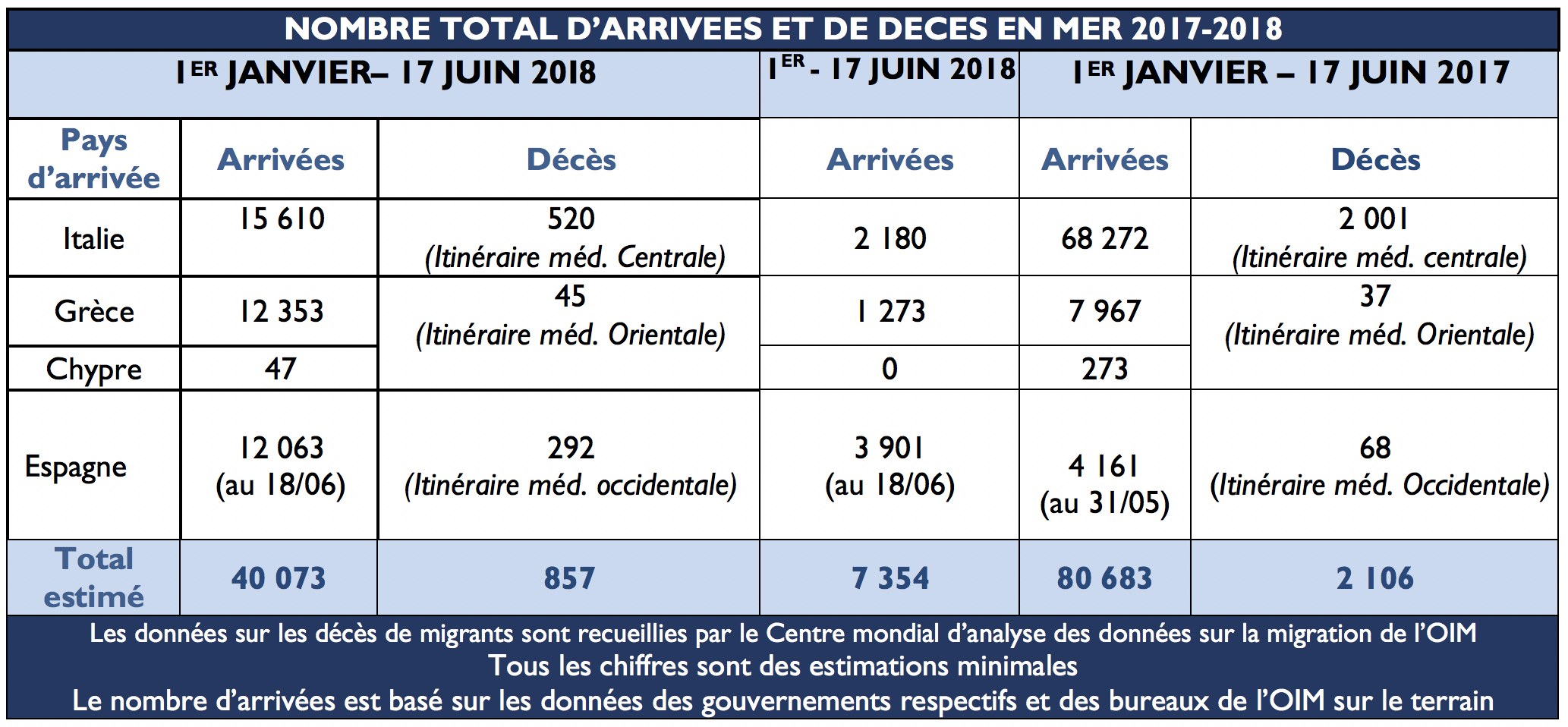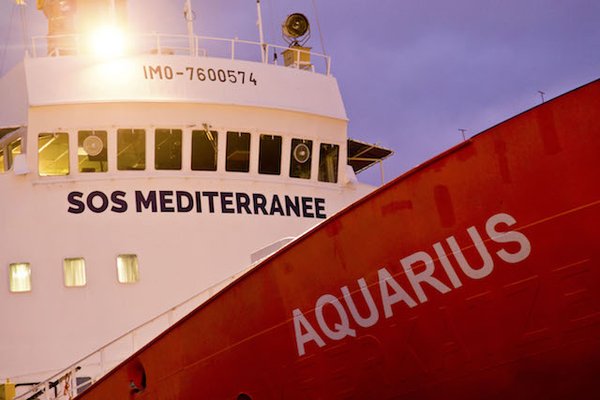Migrations: a crisis, crises, what crisis?
(B2) Between summits, mini-summits and extraordinary meetings, it is indeed the tenth time in three years that the leaders of the European Union are meeting this Thursday (28 May) with, on their table, one of the most hot: migrations
A crisis that is not only political, it is real
Admittedly, the figures are no longer as alarming as in 2015 or 2016, when Europe had to deal with a peak of around 1,2 million asylum seekers. But the situation is still not resolved. Greece still faces continuous arrivals of migrants (around 2000 per month). In Italy, we are no longer at the figure of 15 or 20.000 arrivals per month as in 2015. The flow has decreased by around 75% according to the latest estimates. However, it continues at the rate of a few thousand per month and it should accelerate during these summer weeks when the sea is calmer.
A concentrated arrival of ships still possible
If the current trend continues, we could therefore find ourselves on certain days with a dozen or so boats launched from the Libyan coast, and several thousand people to be rescued at the same time. It's the same principle: between June and August, the number of arrivals doubles or triples compared to the winter months. A series of shipwrecks, with several dozen deaths cannot be ruled out. To this we must add that Italy is out of breath. With nearly 700.000 people collected at sea (678.298 to be exact according to the latest IOM figure) since 2012, nearly 2/3 of them by coast guard vessels, the Guardia di Finanza and the Italian Navy, the effort is not negligible. Welcoming tens of thousands of migrants or refugees is not a godsend.
A policy with its head in the sand
To say that there is a political crisis is therefore rather simplistic, and too easy. It is, once again, to put your head under the sand. Yes, there is a political crisis that is latent, that of a slow withdrawal into oneself, of small nationalisms, but it did not start in the spring of 2018 with the coming to power of the Northern League in Italy (article to be continued). But there is also a real problem not so much of flows, but of migratory imbalance in Europe, of the disorganization of rescue at sea, of the management and distribution of people subsequently recovered, and of a patent lack of solidarity. And this does not date from ten days and one or two boats (Aquarius et Lifeline) left adrift. The shameful reality is that Italy (and Greece) has been left to fend for itself with the problem. We may not agree with the ideology of Matteo Salvini. But the impetuous Italian Minister of the Interior has one quality: he succeeded in putting his foot in the dish and forced the Europeans to look into the problem. It would be time!
The alarm given for four years
For several years, the various leaders who have succeeded in Rome (whether they are called Enrico Letta, Matteo Renzi, Paolo Gentiloni) have sounded the alarm and called for help from Europeans (Read: Don't leave Italy alone in the Mediterranean (Letta)). The Europeans have moved but in their own way, slowly, without rushing.
The Italians did the job
Italy took charge of the relief in no man's land - normally the Libyan zone. Until today, the MRCC center in Rome has managed calls, dispatched ships and coordinated all rescues far beyond its legal rescue zone. Nobody ever complained. Italy even went beyond its responsibilities by authorizing all ships to disembark the survivors thus recovered. There are other safe ports near the Libyan coast (in Tunisia in particular). But everyone thought it was good, without trying to fill this void or make up for the shortcomings.
A failure of a few States
It is this incompetence, not of the European institutions, which have done their job rather well, presented ideas, plans, proposals (1), but of all the European States which has led to the crisis today today. In addition to the natural solidarity that should exist between all countries, two countries in particular have a particular responsibility in this crisis. France and the United Kingdom in particular — as well as NATO — played a dangerous game in 2011, not really in military intervention (in its early stages) but in its pursuit and transformation with the aim of bringing down the regime. Gaddafi (2).
What solutions should be put in place in the short term?
It is not the landing platforms or other hotspots that will solve the question.
Respond within 24 or 48 hours
Today's crisis deserves a rapid response, not in a few weeks or a few months, but in the next 24 or 48 hours. The ships will continue to depart from Libya or Tunisia, to thwart (possible) coast guard blockages, and arrive offshore. It will then be necessary to come to the aid of the castaways. If it is not the ships of the NGOs, it will be (as before the NGOs arrived) the merchant ships or the warships which cross numerous offshore which will have to stick to it. Law of the sea obliges. An iron rule obliging to respond to any SOS.
Have a vessel crisis management structure
Currently, the distribution of responsibilities in the event of the taking over of a ship by Italy or Malta is done somewhat haphazardly, at the political level, or by diplomats directly between them. There is no structure dedicated to this coordination and European distribution. One could think of Frontex to be given this role. But temporary solutions can be found.
Strengthen the Italian MRCC
The simplest and quickest solution is to reinforce the Italian MRCC with officers from different countries and agents in charge of asylum to allow the coordination of the reception of ships and the distribution of their human cargo. The idea of landing platforms (outside the EU) or controlled centers (semi-closed) in the European Union is a medium-term solution, not an emergency solution.
What solutions should be put in place in the medium term?
The medium term is not three to four years but rather the next six months.
Support the Libyan Coast Guard
We can't hide our eyes. There is a need to rebuild a well-resourced, well-paid coastguard force. This requires providing the requested launches and boats (a good dozen), and setting up a larger training plan. Only 213 sailors have been trained. It's not sufficient. This requires training several hundred people.
Set up an MRCC in Tripoli or Libya
It is important, if we want to have a substantial Libyan rescue zone, to have a rescue coordination center at sea, recognized as such and endowed with substantial resources. European expertise could be welcome. NB: Such support had been provided to the crisis management center in Egypt and the Gulf.
Make a deal with the Tunisians
A good part of the flow (which has risen to a fifth recently) now comes from Tunisia, with Tunisians. The economic situation is certainly to blame. Because it is difficult to consider that there is a general situation implying a quasi-automatic right of asylum (as for the Syrians). It is important to set up an agreement with Tunis, with funding and material support at stake.
(Nicolas Gros-Verheyde)
- To try to better manage flows, in 2016 the Commission presented a comprehensive reform of the European asylum system, putting several, sometimes ambitious, texts on the table for European legislators. It has released funding, through the Frontex agency, allowing the Italians' action at sea to be financed in some way. The High Representative has set up (with certain Member States) an operation (EUNAVFOR Med Sophia) whose results are perhaps not staggering but which has the merit of existing. Etc.
- The Europeans and the Italians had made an agreement with Libya, at the instigation of Romano Prodi, quite similar in spirit to that made with Turkey.



